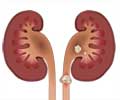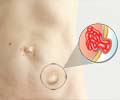Incisional Hernias - Home care instructions
It is important to follow home care instructions after surgery to avoid complications.
Diet
- You can eat a regular diet without any restrictions after surgery. This, of course, will be limited by other illnesses you have, such as diabetes, heart disease or hypertension.
- On the first day, eat small, light, meals and liquids. Progress to a normal diet as tolerated.
- Nausea and vomiting from anesthesia are not uncommon for 24 hours. If you feel nauseous, take clear liquids only. Contact your doctor if nausea and vomiting persist for greater than 36 hours.
- Do not take any alcoholic drinks for at least 24 hours and while you are taking narcotic painkillers with codeine.
Activity
You can do whatever you are comfortable doing, except heavy lifting, after you are discharged.
- For 24 to 48 hours after surgery you may resist movement due to pain. Although you should get rest during this time, it is equally important to get up and walk.
- Do not drive while you are taking narcotic pain medicines and while your incisions hurt. This may reduce your ability to move quickly.
- Your thought processes may take 24 to 48 hours to return to normal because of anesthesia. Do not make any important business or personal decisions during this time.
- It is okay to go up and down stairs, and it is encouraged.
- You can return to work when you feel comfortable you can perform your job safely and at the level you and your employer expect. Usually this is a minimum of one week. If your job involves heavy lifting you should stay out of work for 2-4 weeks.
- Most people find they fatigue easily during the second and even the third week, so don’t overload your schedule.
- Do not return to exercise or strenuous activity until you are seen for a follow-up appointment.
Pain and Discomfort
It is normal to have pain after the operation. How much pain a person experiences usually depends on the individual and not on the operation. Pain normally is located over the incision. Narcotics and painkillers are prescribed for relief from pain.
Keeping ice on the area of surgery for 24 to 48 hours will minimize postoperative swelling and reduce pain. There is no benefit to using ice after the first 48 hours.
Care of the Incision
- Surgical incisions are covered with a gauze pad. It is not uncommon for the pad to become saturated with blood during the first 24 hours. Do not become alarmed; just change the bandages as needed.
- You can take a shower 24-36 hours after surgery. Be sure to gently dry your incisions and replace the bandage.
- After 2-3 days, it is not necessary to keep your incisions covered but it will usually make you more comfortable to do so as you increase your activity.
- If you do not see metal clips or sutures, the sutures are in the skin itself and will dissolve. This occurs 3-4 weeks after surgery and may be associated with a little drainage from the incision.
- It is common for patients to notice some black and blue or maroon discoloration around the incision. This represents a small amount of blood and is normal. It should not alarm you. It is also common for this to only become apparent 2-3 days after surgery as blood in the tissues moves to the surface.
- Contact the doctor if your incision is red, hot and tender; you may have an infection.
- You have been given antibiotics in the operating room prior to surgery. Unless discussed with you, you do not need them after surgery.
- You may also notice black and blue discoloration near your incision. This is not cause for alarm, even if it occurs a few days after the surgery. It will usually resolve in 7 to 10 days.
- It is normal for the incisions and the hernia site to be hard and swollen following surgery. This is called a healing ridge and represents wound healing. It is not a hernia and will go away in eight to twelve weeks.
- Do not tan your incision for one year after surgery, as it will darken your scar.
- Some people believe Vitamin A and Vitamin E applied to the incision helps wound healing.
Bowel habits
- Following your surgery you may notice alterations in your bowel habits.
- Diarrhea can occur from the surgery itself or from the antibiotics you received.
- Constipation is very common and results from the narcotic pain medicine you are taking.
- If you or your family were not informed of anything unusual after surgery, rest assured that everything is fine and went according to plan.
Contact your doctor if you experience:
- Significant bleeding
- Difficulty breathing
- Persistent light headedness
- Chills and/or fever greater than 101°F
- Pus or infection at the incisions
- Inability to pass urine
- Severe pain
- Any worrisome condition














